从中西方谚语中探索中西方文化的差别
- 格式:doc
- 大小:82.50 KB
- 文档页数:17
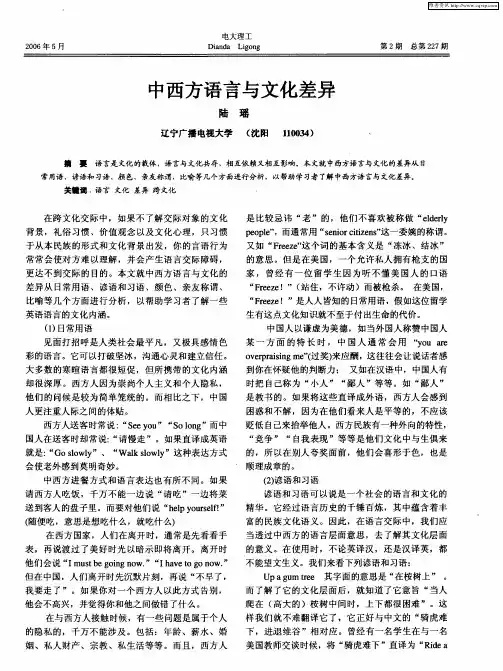
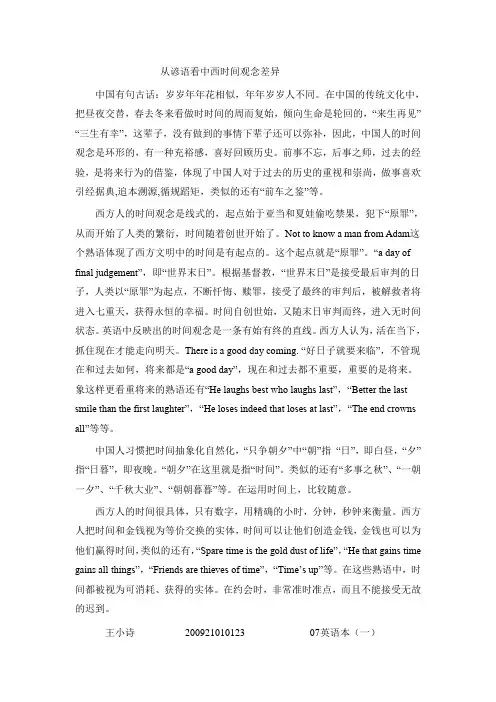
从谚语看中西时间观念差异中国有句古话:岁岁年年花相似,年年岁岁人不同。
在中国的传统文化中,把昼夜交替,春去冬来看做时时间的周而复始,倾向生命是轮回的,“来生再见” “三生有幸”,这辈子,没有做到的事情下辈子还可以弥补,因此,中国人的时间观念是环形的,有一种充裕感,喜好回顾历史。
前事不忘,后事之师,过去的经验,是将来行为的借鉴,体现了中国人对于过去的历史的重视和崇尚,做事喜欢引经据典,追本溯源,循规蹈矩,类似的还有“前车之鉴”等。
西方人的时间观念是线式的,起点始于亚当和夏娃偷吃禁果,犯下“原罪”,从而开始了人类的繁衍,时间随着创世开始了。
Not to know a man from Adam这个熟语体现了西方文明中的时间是有起点的。
这个起点就是“原罪”。
“a day of final judgement”,即“世界末日”。
根据基督教,“世界末日”是接受最后审判的日子,人类以“原罪”为起点,不断忏悔、赎罪,接受了最终的审判后,被解救者将进入七重天,获得永恒的幸福。
时间自创世始,又随末日审判而终,进入无时间状态。
英语中反映出的时间观念是一条有始有终的直线。
西方人认为,活在当下,抓住现在才能走向明天。
There is a good day coming. “好日子就要来临”,不管现在和过去如何,将来都是“a good day”,现在和过去都不重要,重要的是将来。
象这样更看重将来的熟语还有“He laughs best who laughs last”,“Better the last smile than the first laughter”,“He loses indeed that loses at last”,“The end crowns all”等等。
中国人习惯把时间抽象化自然化,“只争朝夕”中“朝”指“日”,即白昼,“夕”指“日暮”,即夜晚。
“朝夕”在这里就是指“时间”。
类似的还有“多事之秋”、“一朝一夕”、“千秋大业”、“朝朝暮暮”等。
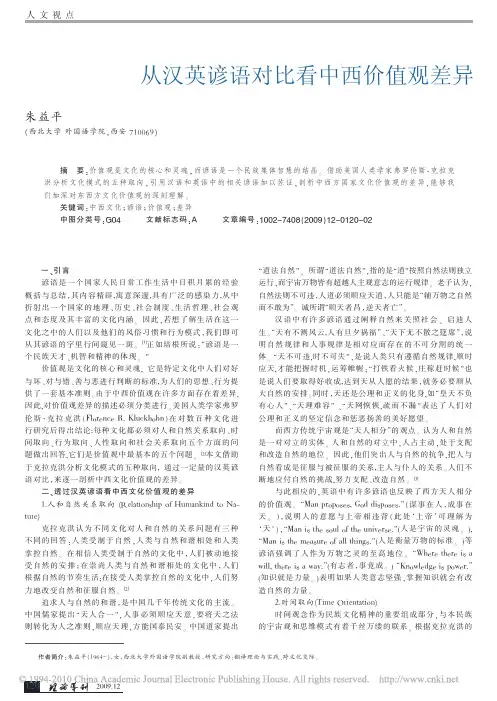
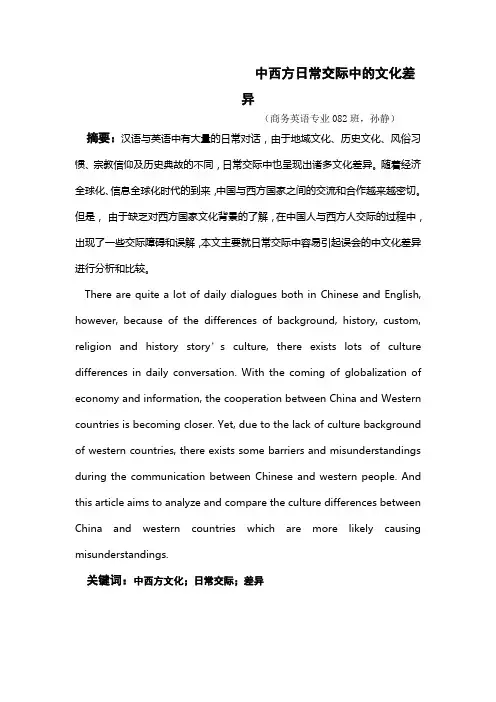
中西方日常交际中的文化差异(商务英语专业082班,孙静)摘要:汉语与英语中有大量的日常对话,由于地域文化、历史文化、风俗习惯、宗教信仰及历史典故的不同,日常交际中也呈现出诸多文化差异。
随着经济全球化、信息全球化时代的到来,中国与西方国家之间的交流和合作越来越密切。
但是,由于缺乏对西方国家文化背景的了解,在中国人与西方人交际的过程中,出现了一些交际障碍和误解,本文主要就日常交际中容易引起误会的中文化差异进行分析和比较。
There are quite a lot of daily dialogues both in Chinese and English, however, because of the differences of background, history, custom, religion and history story’s culture, there exists lots of culture differences in daily conversation. With the coming of globalization of economy and information, the cooperation between China and Western countries is becoming closer. Yet, due to the lack of culture background of western countries, there exists some barriers and misunderstandings during the communication between Chinese and western people. And this article aims to analyze and compare the culture differences between China and western countries which are more likely causing misunderstandings.关键词:中西方文化;日常交际;差异中西方使用两种不同的语言汉语和英语,它们各有反映着本身独特的文化背景和凝重的历史传统,因而在日常交际中也存在着许多差异。
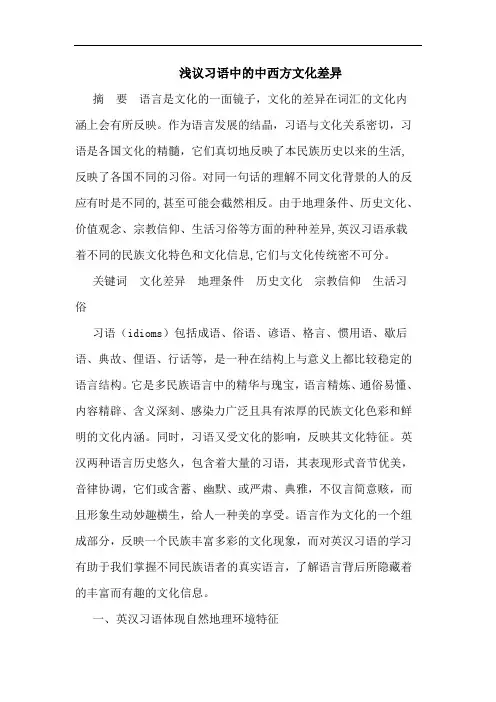
浅议习语中的中西方文化差异摘要语言是文化的一面镜子,文化的差异在词汇的文化内涵上会有所反映。
作为语言发展的结晶,习语与文化关系密切,习语是各国文化的精髓,它们真切地反映了本民族历史以来的生活,反映了各国不同的习俗。
对同一句话的理解不同文化背景的人的反应有时是不同的,甚至可能会截然相反。
由于地理条件、历史文化、价值观念、宗教信仰、生活习俗等方面的种种差异,英汉习语承载着不同的民族文化特色和文化信息,它们与文化传统密不可分。
关键词文化差异地理条件历史文化宗教信仰生活习俗习语(idioms)包括成语、俗语、谚语、格言、惯用语、歇后语、典故、俚语、行话等,是一种在结构上与意义上都比较稳定的语言结构。
它是多民族语言中的精华与瑰宝,语言精炼、通俗易懂、内容精辟、含义深刻、感染力广泛且具有浓厚的民族文化色彩和鲜明的文化内涵。
同时,习语又受文化的影响,反映其文化特征。
英汉两种语言历史悠久,包含着大量的习语,其表现形式音节优美,音律协调,它们或含蓄、幽默、或严肃、典雅,不仅言简意赅,而且形象生动妙趣横生,给人一种美的享受。
语言作为文化的一个组成部分,反映一个民族丰富多彩的文化现象,而对英汉习语的学习有助于我们掌握不同民族语者的真实语言,了解语言背后所隐藏着的丰富而有趣的文化信息。
一、英汉习语体现自然地理环境特征自然环境是人类赖以生存和发展的基础,不同的自然环境对民族文化的形成和发展有着不同的影响,而生活在不同自然环境中的人则会形成不同的文化, 每种文化因其地域、气候环境的不同而具有不同的特征, 习语恰恰包含了这些独特的文化特征。
中华民族生活在广袤肥沃的东亚大陆上,中国自古以来就是一个典型的农业大国,土地在中华文化中占有特殊地位。
因此, 汉语中有相当一部分与农业和土地有关的成语。
如“安土重迁”“五谷丰登”“寸土必争”“地大物博”等。
英国是众多岛屿构成大的岛国,为了生存人们不得不时常与恶劣的海洋气候相抗争。
在征服自然的过程中, 英语中形成了许多与海洋有关的习语。
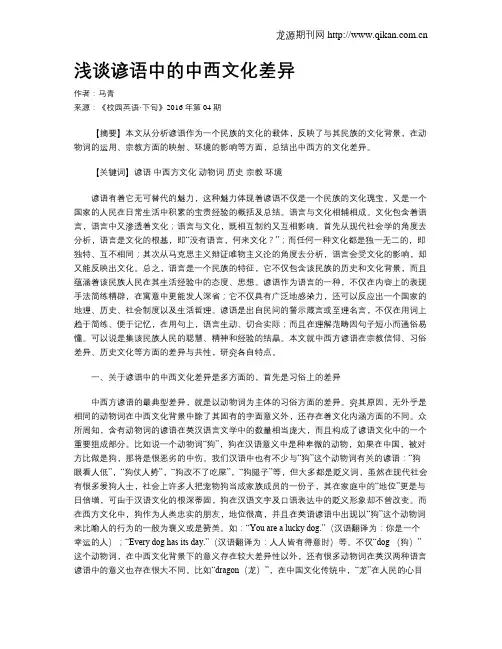
浅谈谚语中的中西文化差异作者:马青来源:《校园英语·下旬》2016年第04期【摘要】本文从分析谚语作为一个民族的文化的载体,反映了与其民族的文化背景,在动物词的运用、宗教方面的映射、环境的影响等方面,总结出中西方的文化差异。
【关键词】谚语中西方文化动物词历史宗教环境谚语有着它无可替代的魅力,这种魅力体现着谚语不仅是一个民族的文化瑰宝,又是一个国家的人民在日常生活中积累的宝贵经验的概括及总结。
语言与文化相辅相成。
文化包含着语言,语言中又渗透着文化;语言与文化,既相互制约又互相影响。
首先从现代社会学的角度去分析,语言是文化的根基,即“没有语言,何来文化?”;而任何一种文化都是独一无二的,即独特、互不相同;其次从马克思主义辩证唯物主义论的角度去分析,语言会受文化的影响,却又能反映出文化。
总之,语言是一个民族的特征,它不仅包含该民族的历史和文化背景,而且蕴涵着该民族人民在其生活经验中的态度、思想。
谚语作为语言的一种,不仅在内容上的表现手法简练精辟,在寓意中更能发人深省;它不仅具有广泛地感染力,还可以反应出一个国家的地理、历史、社会制度以及生活哲理。
谚语是出自民间的警示箴言或至理名言,不仅在用词上趋于简练、便于记忆,在用句上,语言生动、切合实际;而且在理解范畴因句子短小而通俗易懂。
可以说是集该民族人民的聪慧、精神和经验的结晶。
本文就中西方谚语在宗教信仰、习俗差异、历史文化等方面的差异与共性,研究各自特点。
一、关于谚语中的中西文化差异是多方面的,首先是习俗上的差异中西方谚语的最典型差异,就是以动物词为主体的习俗方面的差异。
究其原因,无外乎是相同的动物词在中西文化背景中除了其固有的字面意义外,还存在着文化内涵方面的不同。
众所周知,含有动物词的谚语在英汉语言文学中的数量相当庞大,而且构成了谚语文化中的一个重要组成部分。
比如说一个动物词“狗”,狗在汉语意义中是种卑微的动物,如果在中国,被对方比做是狗,那将是很恶劣的中伤。
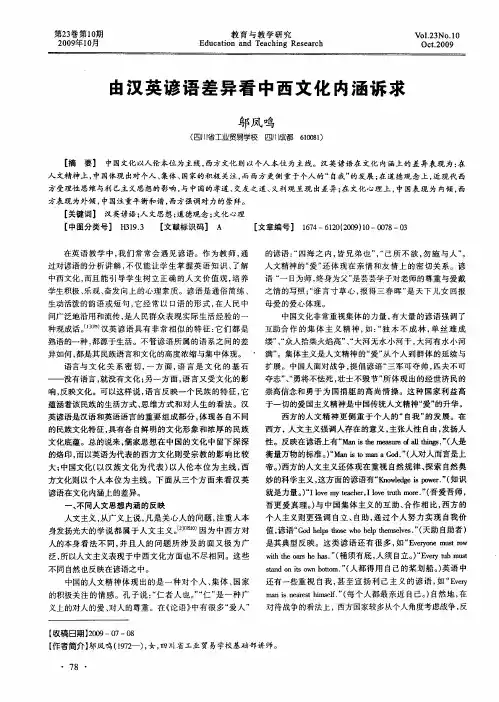


浅谈中西方谚语的文化差异学生:罗玲指导老师:谷一明摘要:谚语是语言文化的瑰宝,它以其深刻、简练的语言浓缩了各民族的历史文化,反映了劳动人民的生活实践经验。
透过谚语的窗口来窥探中西方文化中的风俗习惯、宗教文化及思维方式的差异,令人更深刻的感悟到谚语传递的文化蕴含。
本文着重从谚语折射出的对生存环境、风俗习惯、宗教信仰和道德观念四方面来探讨中西方文化的差异。
通过对中西方谚语的对比研究折射出的文化差异,展现了中西方文化差异带来的异域风情!关键词:谚语;中西方;文化差异;Cultural Differences between English and Chinese ProverbsAbstract: Proverbs are a treasure of language culture, with its profound and concise language condensing history and culture of various nationalities. Most reflect the practical experience of working people's life. Through the proverbial window to spy the differences of Western and Chinese social customs and habits religion, and way of thinking, people come to perceive more profound cultural implication passed on by proverbs. This article focuses on the living environment, customs, religious beliefs and moral conception reflected by the proverbs, in these four aspects to explore differences between Western Chinese culture.Through the comparative study of Chinese and Western proverbs, this demonstrates the exotic differences between Chinese and Western culture.Key words: proverbs;west and east; cultural differences;ContentsIntroductionPart I The definition,classifications and features of proverbs1.1The definition of proverbs1.2The classifications of proverbs1.3The features of proverbs1.3.1The particular syntactic structurePart II The functions of proverbs2.1 The phatic communication2.2 Cultivation of mind and formation of behavior2.3 Perception of the nature2.3.1 Experience of observing weather2.3.2 Awareness of creature’s survival and reproduction2.4 Summarizing the experience of life2.4.1 appropriate way of interpersonal relationship2.4.2 experience obtained from workPart III Cultural Difference between Western and Chinese proverbs3.1 Different way of life3.1.1 The majority of English proverbs concerning sailing,fishing3.1.2 Chinese proverb associated more with agricultural production3.1.3 Geography determines the way of life3.2 Proverbs demonstrate the different customs3.2.1 Different culture of pets3.2.2 The valuation of etiquette3.2.1.4 Chinese value friendship3.2.1.5 Westerners are self-centered3.3 Proverbs reflects the differences of religious belief3.3.1 Most westerners believe in Christian3.3.1.1 God is the supreme god3.3.1.2 Advocation of equality3.3.2 Chinese largely believe in buddhism,taonism,confucianism3.3.2.1 Atheism,believe in the power of abstraction3.3.2.2 Hierarchical,class-oriented from person to person3.4 Proverbs embodies the differences of the moral conception3.4.1 The different value of the public reputation3.4.3 Ongoing discrimination against chinese women3.4.4 western women are of high statusConclusionBibliography。
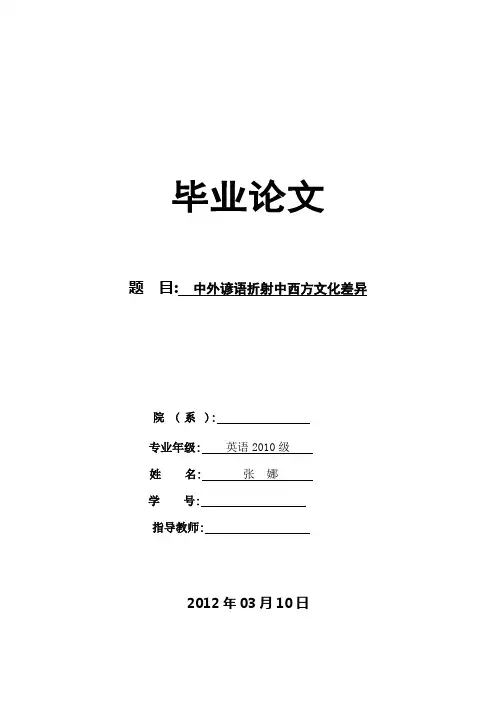
毕业论文题目: 中外谚语折射中西方文化差异院(系):专业年级: 英语2010级姓名: 张娜学号:指导教师:2012年03月10日中外谚语折射中西方文化差异[摘要] 谚语是语义相对完整的固定句子。
使用时可作为句子成分,也可作为独立的交际单位,表达完整的意思。
在英语教学中大量使用英语谚语,不仅可以使学生了解各国的历史、文化和风土人情,丰富知识,扩大视野,还使学生在形象感受中对其深刻内容牢记不忘,所以说,学习谚语对于学好英语有很大的帮助。
谚语内容精辟,语言生动,短小精悍,通俗易懂,因而有广泛的感染力。
因此,进行汉、英谚语的文化含义研究,对语言文化研究有重要意义。
语言与文化是分不开的。
语言是文化的一部分,但是它又是一种特殊的文化。
语言与文化间的关系,是双向的影响制约的关系。
在文化上,谚语既反映人类共同的认识,又反映民族文化的差异。
充分弘扬人类共同的知识财富,又能相互吸收民族文化的精华,是研究和使用谚语时应该兼顾的。
[关键词]语言,谚语,文化,差异目录1.前言.................................................................................................................. 错误!未定义书签。
4 2.英汉谚语差异的具体表现.. (5)2.1 二级标题 (5)2.2 二级标题 (7)2.2 二级标题 (9)2.2 二级标题 (11)2.2 二级标题 (12)2.2 二级标题 (14)3.结论 (15)参考文献 (17)中外谚语折射中西方文化差异一、前言首先我们先来了解一下何为谚语。
谚语是语义相对完整的固定句子。
使用时可作为句子成分,也可作为独立的交际单位,表达完整的意思。
谚语以最简短的形式表达最丰富的内容,语言生动活泼,富有生活气息。
不少谚语以形象的比喻阐述事物的规律,具有很深的哲理。
在英语教学中大量使用英语谚语,不仅可以使学生了解各国的历史、文化和风土人情,丰富知识,扩大视野,还使学生在形象感受中对其深刻内容牢记不忘,所以说,学习谚语对于学好英语有很大的帮助。
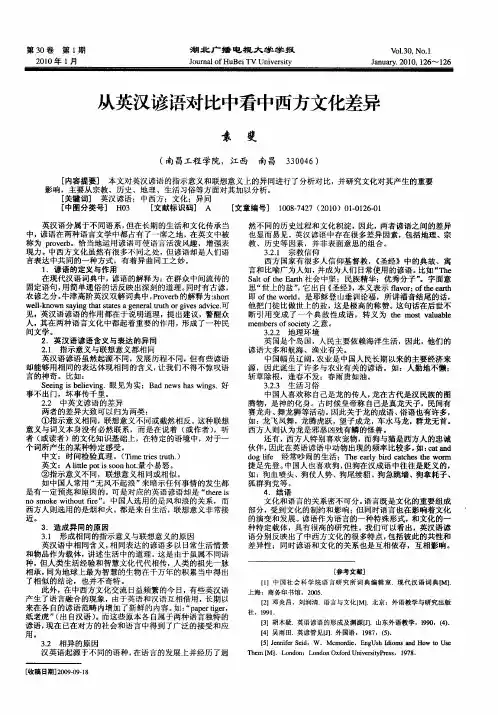
汉英谚语折射的中西文化差异汉英谚语是中西方文化的一大特色,它们折射了两种不同文化的思维模式、价值观以及生活方式。
中西方的文化差异导致了不同的思维方式,而谚语则是这种不同思维方式的体现。
本文将从中西方的思维方式、价值观、传统文化等多个方面来探讨汉英谚语的不同之处。
一、思维方式中西方的思维方式有很大的差异,这种差异也反映在谚语中。
中国人一般使用“象征性思维”,而西方人则多采用“逻辑性思维”。
中国的谚语多通过生动的比喻和寓言来表达思想和感情,这种表达方式的主体在于“感性思维”。
比如中国谚语中的“九十九难,唯有耐性来得通”、“家丑不可外扬”、“杀鸡给猴看”等等,这些谚语都包含着深刻的道理和生活智慧,但多以隐喻、寓言等方式表达出来。
而西方的谚语则更多体现了“逻辑性思维”,强调语言的规范性和逻辑性。
比如英语中的“all roads lead to Rome(所有的路都通往罗马)”、“you can't have your cake and eat it too(两者不能兼得)”等等,这些谚语很少采用生动的比喻等手法,而是通过表达逻辑关系来证明某一观点或道理。
二、价值观不同的文化往往有着不同的价值观。
汉英谚语的不同之处还表现在它们所体现的价值观上。
中国的传统文化强调“仁义礼智信”等价值观,而这些价值观也影响了中国谚语的表达方式。
比如“有志者事竟成”、“宁为玉碎,不为瓦全”、“己所不欲,勿施于人”等等,这些谚语反映了中国传统文化中强调的努力、坚强、自律、为他人着想等价值观。
西方文化则强调个人的自我实现和自我表达,西方谚语中强烈的个人主义色彩也反映了这种价值观。
比如“no pain, no gain(不劳则无获)”、“be yourself(做自己)”等等,这些谚语强调个人的独立性和自我担当的精神。
三、传统文化的影响不同的传统文化对汉英谚语的表达方式产生了巨大的影响。
中国的传统文化重视道德与修养,这种价值观也体现在谚语中。
以实例浅析中西方文化差异摘要:本文从与两位来自美国青年志愿者的生活与学习中,深刻体会到中西方在教育、宗教、隐私、饮食、社交习惯及价值观等方面存在的差异。
对于这些差异的分析和探究让我们可以更深入地理解西方人的思维和行事方式,从而使我们的交流更有效,更顺畅。
关键词:中西方文化交流文化一词,汉语中就是“人文教化”的简称。
而文化的构成,最常见的是物质、制度、精神三个方面。
中国俗语说:一方水土养一方人,不同地域的人,由于自然环境、思想观念、人文历史等的不同,从而造成了“人文教化”的差异。
在现实生活中,当两个不同国家民族的人在一起交流沟通时,两种不同的文化也就会摩擦碰撞。
“非我族类、其心必异”正是这种文化差异下人性的真实写照。
本文从笔者个人在现实生活中接待国外来访者所感受到的中西方文化差异做一简要探究。
2009年3月和2011年3月,笔者先后接待了美国哥伦比亚大学的Jack Goets和哈佛大学的Brain Mendal(都为大学一年级学生)来苏州信息职业技术学院进行社会实践,在校园开展英语角活动,与学生在英语课堂中进行互动交流。
期间两位青年志愿者住在笔者家里并和笔者的家人一起生活,在与他俩朝夕相处的几个月中,笔者切身感受到了中西方文化在教育、宗教、饮食、价值观念等诸多方面的差异。
一、中西文化在教育方面的差异Jack和Brain来我家时,我儿子正处于小学高年级阶段,这时候的小孩由于玩心正浓,所以在平日的生活中我管束的比较严格,事无巨细都插手干涉。
有次我带Brain去儿子学校,孩子们正在操场上放风筝,我想让Brain也感受放风筝的乐趣,就要求儿子把风筝让给Brain,儿子虽然不情愿,但还是接受了我的要求。
Brain对此事很有看法,他说在美国,人们对孩子的要求不是服从,而是尊重,更注重的是平等、交流和对孩子自尊心的保护。
因为在他们看来,即使是未成年人,也有自己的人权和自尊心,蹲下来与孩子平等的交流是家长一贯的做法。
从语言方面看中西方文化差异语言是社会的产物,是人类历史和文化的结晶。
它凝聚着一个民族世代相传的社会意识,历史文化,风俗习惯等各方面人类社会所有的特征。
不同的文化背影和文化传统,使中西方在思维方式,价值观念,行为准则和生活方式等方面也存在有相当的文化差异。
透一管可窥全豹,我就从语言方面来谈谈中西方的文化差异:1称谓及称呼: 学习英语时,我们不难发现英语中的称谓名称比汉语中的要少得多,例如,英语中cousin一词,对应于汉语的表兄、表弟、表姐和表妹等。
我们看到,汉语把表亲关系区分得非常严格,既要说出性别,又要分出大小,根本不像英语笼统一个词了事。
这种语言现象的产生归因于中国二、三千年之久的封建统治。
这种封建社会高度重视血缘关系,特别强调等级间的差异,提倡长幼、尊卑有序。
亲属关系亲疏,长幼和性别等万面不同,权力和义务也随着出现区别,故称谓区分得严格而细密。
英语中的称谓为数不多,除 dad, mum, grandpa, aunt, uncle等几个称谓经常使用外,其它的几乎都不用。
在汉语里,一般只有彼此熟悉亲密的人之间才可以“直呼其名”。
但在西方,“直呼其名”比在汉语里的范围要广得多。
在家庭成员之间,不分长幼尊卑,一般可互称姓名或昵称。
比如: 小孩子在家里,可以直接叫爸爸、妈妈的名字。
不把爷爷奶奶称作grandpa和grandma,而是直呼其名,这种做法却是得体,亲切、合乎常理的。
在西方,常用“先生”和“夫人”来称呼不知其名的陌生人,对十几或二十几岁的女子可称呼“小姐”,结婚了的女性可称“女士”或“夫人”等。
对所有的男性长辈都可以称“叔叔”,对所有的女性长辈都可以称“阿姨”。
年轻人称老年人,只在其姓氏前加 Mr, Mrs 或Miss。
这在我们中国是不行的,必须要分清楚辈分、老幼等关系,否则就会被认为不懂礼貌。
他们这些做法体现了西方人追求人人平等的思想,在他们眼中,称谓本身就意味着不平等。
2、敬语谦词: 像称谓一样,英语中的敬语谦词也远远少于汉语。
从英汉谚语看中西文化差异1?币?言谚语是特殊的、具有完整意义的固定句式。
它不仅是语言的一部分,也是文化的一部分。
由于各个民族在政治,经济,历史,地理等方面的差异,通过谚语所反映出来的文化也显示出了差异。
因为英语和汉语属于不同的语言体系,所以它们的谚语反映出了文化的不同。
目前,在英汉交往中我们注重较多的是对基本语言技能的培养和训练,而对文化差异却不够重视。
随着经济全球化的发展,英汉之间的交往将成为全球化的主流趋势之一。
因此,中西文化差异必须引起我们足够的重视。
谚语作为语言的组成部分与文化有着密切的关系。
通过对英汉谚语进行比较和分析,我们能够归纳出中西文化的差异。
探讨汉语谚语和英语谚语之间存在的文化差异,我们可以从中得到一些有益的启示,可为英汉语言教学和跨文化交际提供一定的借鉴意义。
这篇文章从自然环境、宗教信仰、生活方式、文化传统、思维方式与文化心理、人文思想和时间取向等方面说明和讨论了英汉谚语所体现的中西文化差异,并且能从中得到一些英汉教学和跨文化交际方面的启示。
2.英汉谚语反映出的中西文化差异文化对语言特点有非常重要的影响。
由于中西文化在自然环境、宗教信仰、生活方式、文化传统、思维方式与文化心理、人文思想和时间取向等方面的不同,因此英汉谚语的不同是显而易见的。
2.1自然环境有些谚语与当地的地理环境和自然风景有紧密的联系,因此英汉谚语在这一方面有很多不同之处。
例如,中国有很多的山河,于是有了以下的谚语:有眼不识泰山。
长江后浪推前浪,一代新人换旧人。
但是,西方的许多国家都临近海洋,人们的生活与海洋息息相关。
例如:It is hard sailing where there is no wind. 无风难使帆。
A smooth sea never made a skillful mariner. 平静的大海练不出好水手。
上面的谚语反映了不同国家的不同自然环境,一个国家的文化背景与其自然环境有着密切的联系。
浅谈谚语在中西方文化中的作用及在教学中的影响浅谈谚语在中西方文化中的作用及在教学中的影响一、引言谚语是一个民族智慧的精华所在,它反映人们在长时期生活与斗争实践中的体会或经验,短短的一、两句话每每寓意深长,读起来耐人寻味。
有的喻事明理,给人以某种启迪;有的概括反映某一方面的知识、经验或教训,供人学习与借鉴。
每一条谚语在一定的环境中都是一句颠扑不破的真理。
它们包含了深刻的哲理,又有着优美的语言,不是道破了世情的奥秘就是给人们指点了生活的航程二、谚语在文化中的作用语言是文化的载体,任何一种语言都反映了与其相应的文化。
一个民族的语言势必反映该民族的文化,中西方不同的语言决定了它们之间必然存在着交流上的障碍,即文化差异。
语言作为文化的组成部分,反映了该民族丰富多彩的文化现象。
习语是语言的精华,因而习语在体现语言的文化差异上,比其它语言成份更具有典型性、代表性。
对其差异性的探讨与研究,将有利于人们跨越不同的文化。
正确把握这两种谚语必须建立在多文化的深刻理解的基础上,才能准确理解其蕴涵的哲理以及幽默所在。
在口头表达和书面写作中,谚语的功能主要体现在:(1)形式对称,表现力强“刀不磨要生锈,人不学要落后。
”这句谚语,在形式上对称工整,语言简洁,所表达的意思不言自明,着重强调了学习的重要性。
用这样的谚语来“论证”,往往胜过冗长而枯燥的说理。
speech is silver,silence is old.雄辩是银,沉默是金when wine sinks,words swim.美酒一下肚,话匣关不住。
在大量的谚语中,较多地使用了各种修辞手法,比如比喻、借代、对偶、排比、夸张等,这使得谚语在形式上更为生动活泼,更加受到人们的青睐。
(2)影射哲学思想,具有教育意义“谁往天上吐痰,掉下来说会落在他自己脸上。
”,这句谚语通过日常行为的简单描写,但反映出的哲理却是深刻形象的,让人深深体会到“害人终害己”的基本道理。
“instead,life is like revolvin door,when it closes it also opens.”(其实,生活就像一道旋转门,当他关闭时,也为你打开了另一扇);“to know everythin is to know nothin.”(万事皆通等于万事不通)。
中西方的文化差异表现在诸多方面:一、中西方言谈的差异在中国,对别人的健康状况表示关心是有教养、有礼貌的表现。
但对西方人的健康表示关心,就不能按中国的传统方式了。
一个中国学生得知其美籍教师生病后,会关切地说“you should go to see a doctor!(你应该到医院看看)。
”不料,这句体贴的话反而使这位教师很不高兴。
因为在这位教师看来,有病看医生这种简单的事情连小孩都知道,用不着任何人来指教。
如果就某种小事给人以忠告,那显然是对其能力的怀疑,从而大大伤害其自尊心。
中国人在饭桌上的热情好客经常被西方人误解为不文明的行为。
因西方人认为:客人吃多吃少完全由自己决定,用不着主人为他加菜添酒,而且饮食过量是极不体面的事情,因此客人吃饭后,主人不必劝他再吃。
一位美国客人看到中国主人不断地给他夹菜很不安,事后他抱怨说“主人把我当猪一样看待。
” 中国人路遇熟人时,往往会无所顾忌地说:“啊呀,老兄,你近来又发福了!”或者以关切的口吻说:“老兄,你又瘦了,要注意身体啊!”而西方人若听你说“you are fat(你胖了)”或“you are so thin(你又瘦了)”, 即使比较熟悉,也会感到尴尬和难以作答。
二、价值观与道德标准的差异1.个人荣誉感与谦虚谨慎西方人崇拜个人奋斗,尤其为个人取得的成就自豪,从来不掩饰自己的自信心、荣誉感,以及在获得成就后的狂喜。
相反,中国文化不主张炫耀个人荣誉,而是提倡谦虚。
中国人反对王婆卖瓜式的自吹自擂,然而中国式的自我谦虚或自我否定却常常使西方人大为不满。
“Your English is very good(你的英文很好),” “No, no, my English is very poor (不,我的英文很差)”;“You’ve done a very good job(你的工作做的很好),” “No, I don't think so. It's the result of joint efforts(不,这是大家共同努力得结果).” 这种谦虚,在西方人看来,不仅否定了自己,还否定了赞扬者的鉴赏力。
摘要谚语是意义完整的固定句子,是一种重要的语言形式。
在不同文化的谚语中,相同的物体和行为往往被赋予不一样的含义和思想感情。
本文研究的目的便是通过研究英汉谚语来探索中西方文化的差异。
文章首先从谚语的构成方面比较了英汉谚语的差异,然后从中西方人们的居住环境、人文思想、道德观念、宗教信仰和风俗习惯五个方面对英汉谚语进行比较和分析,并总结出中西文化在这些方面的差异。
通过本文对英汉谚语的研究和总结,我们将学习到两种谚语的不同文化内涵,更重要的是,这有助于我们更加正确地使用英汉谚语。
因此,研究中西方谚语之间的文化差异具有重大的理论和现实意义。
关键词:谚语;中西方文化;差异AbstractProverb is a complete sentence,and it is an important form of language. In the different proverbs that from different culture, the same things and the same behavior show represent different means and different feelings. The paper is aimed to explore the cultural differences between Chinese and Western proverbs. Firstly, the author analysis the differences from their unique characteristics, then summarizes the differences of living environment, humanistic idea, moral views, religious beliefs and social customs between Chinese culture and Western one by comparing and analyzing Chinese proverbs and English ones. Through the study and summary of this paper we will learn the different cultural connotation from different culture. What’s more, we will use Chinese and Western proverbs more easily and more accurately. So it is no exaggeration to say that a comparison between English and Chinese proverbs is of great practical and theoretical significance.Key words: Proverbs; Western and Chinese culture; differencesAcknowledgementsI would like to express my gratitude to all those who helped me during the writing of this thesis. I gratefully acknowledge the help of my supervisor, Xia Li, who has offered me valuable suggestions in the academic studies. Without her encouragement, insightful criticism and gracious guidance, the completion of this thesis would not have been possible.I also owe a special debt of gratitude to all the teachers in Foreign Languages School, from whose devoted teaching and enlightening lectures I have benefited a lot and academically prepared for the thesis.I should finally like to express my gratitude to my beloved parents who have always been helping me out of difficulties and supporting without a word of complaint.OutlineⅠ. IntroductionⅡ. The Characteristics and Impact of ProverbsA. The Unique Characteristics of Proverbs1. Form of Characters2. Sentence Pattern3. Rhetorical DevicesB. The Position and Role of Proverbs in the Real LifeⅢ. The cultural differences of Chinese and Western ProverbsA. Proverbs of Living EnvironmentB. Proverbs of Humanistic IdeaC. Proverbs of Moral Views1. The Attitude Towards Reputation2. The View of Love3. Filial Duty4. The Attitude Towards WomanD. Proverbs of Religious Beliefs1. God and no God2. The Idea of Equality and GradeE. Proverbs of CustomⅣ.ConclusionCultural Differences between Chinese and English Proverbs Ⅰ. IntroductionDuring the etymology, proverb is defined as a settled saying accompanied with the long history. In the modern version of the Dictionary, proverbs indicated these briefly, popular and meaningful sentences which are popular in folk among traditional social of China. In western, many English dictionaries have the analogous definition which is popular short saying with words of advice or warning. There are many proverbs in our daily life and be used very popular during our daily life.“Genius wit and spirit of a nation are discovered by their proverbs.”said by Bacon, a well-known British writer. Every nation has abundant proverbs in their own native language, which were using reflect their life experience, thoughts and feelings.Ⅱ. The Characteristics and Impact of ProverbsA.The Unique Characteristics of ProverbsAs a quintessence of native language, proverbs have many unique characteristic which different from other language forms. Next we will introduce its characteristics through the three aspects include characters form, sentence pattern structure and rhetorical device.1. Form of CharactersProverb is summarizes of labor practice of the masses, it has a heavy flavor of life. The English and Chinese proverbs have regular sentence pattern and shapely syllable, it selects the words is very refined. Proverbs can express luxuriant idea content with highly condensed language. It has highly ability of generalizing, which aimed at reflect a profound moral vividly. It displayed mainly follow the three points: First of all, proverbs always using small amount of words and flat structure to compress the abundant content. These sentences, which are dapper, crisp andfinger-popping, embodies the language feature of English and Chinese native. For example: Live and learn(活到老,学到老);After rain comes sunshine(雨过天晴).In our native proverbs, there are also many examples like: 物以类聚,人以群分;两人伴,三人散。